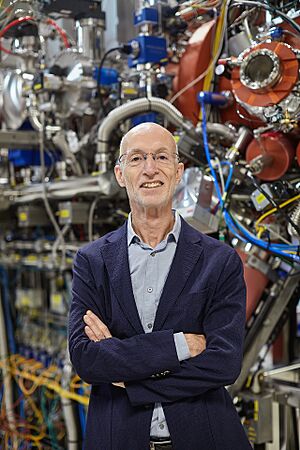Stuart Parkin facts for kids
Quick facts for kids
Stuart Parkin
|
|
|---|---|

Stuart S. P. Parkin at the Max Planck Institute of Microstructure Physics
|
|
| Born |
Stuart Stephen Papworth Parkin
9 December 1955 Watford, England
|
| Nationality | British |
| Alma mater | University of Cambridge |
| Known for | Discoveries on spintronic materials, that allowed a 1000-fold increase in hard disk data density. Racetrack memory (RTM) |
| Awards | Europhysics Prize (1997) Humboldt Research Award (2004) Dresden Barkhausen Award (2009) IUPAP Magnetism Award and Néel Medal (2009) David Adler Lectureship Award (2012) Von Hippel Award (2012) Swan Medal and Prize (2013) Millennium Technology Prize (2014) King Faisal Prize (2021) Clarivate Citation Laureate (2023) APS Medal (2024) Draper Prize (2024) |
| Scientific career | |
| Fields | Material sciences spintronics |
| Institutions | Max Planck Institute of Microstructure Physics University of Halle-Wittenberg Stanford University IBM Research |
Stuart Stephen Papworth Parkin (born 9 December 1955) is a British scientist. He is an experimental physicist and a leader in the field of spintronics. He works as a Managing Director at the Max Planck Institute of Microstructure Physics in Germany. He is also a professor at the Martin-Luther-University Halle-Wittenberg.
Dr. Parkin is famous for his work with spintronic materials. His discoveries helped make computer hard drives store much more data. This work earned him the 2014 Millennium Technology Prize. People sometimes call him the "spin doctor" because of his important research.
Before his current role, Parkin worked at IBM Research in California. He was an IBM Fellow, which is IBM's highest technical honor. He also taught at Stanford University and directed a research center there.
Contents
Early Life and Education
Stuart Parkin was born in Watford, England. He went to the University of Cambridge for his studies. He earned his first degree in 1977 and his PhD in 1980.
In 1982, he joined IBM as a special research fellow. He became a permanent staff member the next year. His early education set the stage for his groundbreaking scientific career.
What is Spintronics?
Spintronics is a new field of electronics. It uses the "spin" of electrons, not just their electric charge. Think of an electron like a tiny spinning top. This spin can be "up" or "down." Scientists can use these two states to store and process information. This is different from regular electronics, which only use the electron's charge. Spintronics can lead to faster, smaller, and more energy-efficient devices.
Parkin's Important Discoveries
In 1989, Stuart Parkin made a big discovery. He found out how magnetic layers can "talk" to each other. He showed that if you put a very thin non-magnetic metal layer between two magnetic layers, their magnetic directions can switch back and forth. This is called "oscillatory interlayer coupling."
He found this using a simple machine he built himself. He also showed that this effect happens with many different metals. His work helped create the field of spintronics. He is known as a very productive scientist in this area.
Parkin also improved magnetic tunneling junctions. These are tiny devices that can create a very fast type of computer memory. This memory is called Magnetoresistive random-access memory (MRAM). MRAM is special because it is fast, can store a lot of data, and remembers information even when the power is off.
In 2001, Parkin made MRAM even better. He used a material called MgO to make the junctions work more efficiently. IBM then developed the first MRAM prototype.
Future of Data Storage
Dr. Parkin is working on a new type of memory called Racetrack memory. This memory could replace both traditional hard drives and many types of solid-state memory. Imagine data moving along a "racetrack" inside a tiny device. This could make computers even faster and store even more information.
He also researches spin transistors and spin-logic devices. These could lead to a new generation of electronics that use much less power.
Awards and Recognition
Stuart Parkin has received many awards for his scientific work. Some of these include:
- The Europhysics Prize in 1997.
- The Humboldt Research Award in 2004.
- The Millennium Technology Prize in 2014, for his work that greatly increased digital data storage.
- The King Faisal Prize in Science in 2021.
- The Clarivate Citation Laureate in Physics in 2023. This award is given to scientists who are likely to win a Nobel Prize.
- The Charles Stark Draper Prize in 2024, for his inventions in spintronics.
He has written over 670 scientific papers and holds more than 123 patents. A patent means he invented something new and has the rights to it. He is also the chief editor of a science journal called Spin.
Memberships and Fellowships
Dr. Parkin is a member of many important scientific groups. These include:
- The Royal Society
- The American Physical Society
- The National Academy of Sciences in the United States
- The National Academy of Engineering
- The German Academy of Sciences Leopoldina
These memberships show that he is highly respected by other scientists around the world.

